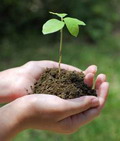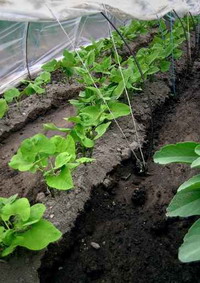 Worms and the environment
Worms and the environment
Nothing and nobody can be compared to worms on the positive role they play on all nature.
They create soil and everything that lives there. These are the most numerous animals on the planet and the major processors of organic matter into humus, thus ensuring soil fertility and functions of the biosphere: disinfection, neutralization, protection and production.
One of the first concerns regarding vermicomposting is the likelihood that this process does not destroy certain potentially dangerous pathogens because it does not reach the high temperatures of composting.

In recent years, however, strong evidences have highlighted the fact that many worms destroy pathogens, although we do not yet know by what method. The best data on this point comes from Florida, where the Division of Environmental Protection of Orange County has conducted a study to assess the ability of vermicomposting to meet Class A standards for biosolids stabilization.
The results of this study showed that vermicomposting could be effectively used as a method of destroying pathogens, with a success rate equal to conventional composting (Eastman, 1999, Eastman et al., 2000). More recently, Dr. Elaine Ingham has discovered during his research that when dissected worms living in a material with high content of pathogens, there is no trace of pathogens beyond the first five millimeters of their intestines. In other words, "something" inside destroys pathogens, so that worm castings (excrement) do not contain it.
Other researchers (eg. Paul et al., 2002) have stressed that the GHG benefits of composting are not from the process itself, but from initially avoided and consecutively processes.
At first, we prevent organic materials like manure on farms to be stored in anaerobic conditions or applied in the rough in the fields, two practices that generate high emissions of methane and nitrous oxide.
In a second step, we avoid the production and transportation of commercial fertilizer over large distances, two major activities generating greenhouse gas emissions.
The potential benefits of composting described above also apply to vermicomposting.
Theoretically, however, vermicomposting should provide significant advantages compared to composting in terms of GHG emissions.
Firstly, it is not necessary to return the vermicompost, either manually or with machinery, since the worms aerate the material themselves. This should thus reduce the presence of anaerobic zones in the heap and, consequently, emissions of methane. It also reduces the fuel consumption by farm machinery that should be used, if it was necessary.
On the other hand, the superior efficacy of vermicompost (5 to 7 times) compared to compost in terms of growth and yield of cropscorresponds to an equivalent reduction (approximately from 5 to 7 ) of transportation and manufacturing of chemical fertilizers which would be used otherwise - which reduces greenhouse gas emissions.
Finally, the analysis of samples of vermicompost showed N concentrations generally higher than the compost samples from similar inputs. This means that this process succeeds in retaining more nitrogen, a feature probably due to micro-organisms present in greater numbers, which also suggests that generates and emits less nitrous oxide.
Knowing that N2O is 310 times more potent than CO2 on the effects on the ozone layer, it appears that it is a significant benefit.
 Earthworms have a vital role to play in maintaining biodiversity. They increase the amount and types of micro-organisms in the soil by creating conditions conducive to their life and reproduction. It was said that the worm was a small "bacteria factory", rejecting many more microorganisms than it ingests. By adding vermicompost and cocoons in the soil of a farm, you greatly enrich the microbial community of this ecosystem. Ground Biodiversity is the basis of the development of the biodiversity of the surface as the soil creatures and plants which they help to grow represent the basis of the entire food chain.
Earthworms have a vital role to play in maintaining biodiversity. They increase the amount and types of micro-organisms in the soil by creating conditions conducive to their life and reproduction. It was said that the worm was a small "bacteria factory", rejecting many more microorganisms than it ingests. By adding vermicompost and cocoons in the soil of a farm, you greatly enrich the microbial community of this ecosystem. Ground Biodiversity is the basis of the development of the biodiversity of the surface as the soil creatures and plants which they help to grow represent the basis of the entire food chain.
The United Nations Environment Programme (UNEP) has recognized the importance of underground biodiversity as a key to sustainable agriculture, biodiversity and surface of the global economy.
Vermicomposting and vermiculture are ecological processes with considerable potential as components of sustainable agriculture. The rapid growth of the use of compost worms in countries like Cuba, India, Argentina and Australia demonstrates the inherent value of a partnership between the dominant species on the surface of the globe (you and me) and the dominant ground species (worms of all kinds).
Each farmer depends on worms to some extent, whether they work for you just below the surface soil in your fields, or whether you bring them to the surface to maximize the partnership through waste management, vermiculture and production of compost tea, this will be an individual choice based on need, offered possibilities and interest.
Ferme Lombricole du Moutta - Vermiculture Farm of Moutta © - Legal notice - Realization axyneT



